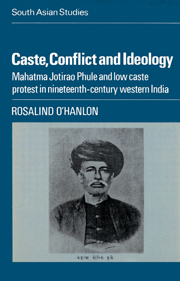 Caste, Conflict and Ideology
Caste, Conflict and Ideology Book contents
- Frontmatter
- Contents
- Acknowledgements
- Notes on translations and area under study, with map
- Part 1 Introduction
- 1 Low caste protest in nineteenth-century western India
- Part 2 Religion and society under early British rule
- Part 3 Jotirao Phule and his circle: the emergence of a distinctive radical voice
- Part 4 The creation of a lower caste identity in history and popular culture, 1869–73
- Part 5 The lower caste community in contemporary society
- Part 6 Ideology and the non-Brahman movement in the 1880s
- Bibliographic note
- Bibliography
- Glossary
- Index
1 - Low caste protest in nineteenth-century western India
from Part 1 - Introduction
Published online by Cambridge University Press: 14 October 2009
- Frontmatter
- Contents
- Acknowledgements
- Notes on translations and area under study, with map
- Part 1 Introduction
- 1 Low caste protest in nineteenth-century western India
- Part 2 Religion and society under early British rule
- Part 3 Jotirao Phule and his circle: the emergence of a distinctive radical voice
- Part 4 The creation of a lower caste identity in history and popular culture, 1869–73
- Part 5 The lower caste community in contemporary society
- Part 6 Ideology and the non-Brahman movement in the 1880s
- Bibliographic note
- Bibliography
- Glossary
- Index
Summary
Jotirao Govindrao Phule was the son of an obscure lower caste family who pioneered the attack on the religious authority of Brahmans, and their predominance in the institutions of the British government and administration. He was born in Pune in the Deccan, shortly after the East India Company's assumption of power in western India, into a family of fruit-and-vegetable growers. Phule's antecedents were not such as to suggest any great aptitude in the field of ideas, or for commanding the loyalties of large numbers of men. Yet his initiative set off a broad and very active movement of the lower castes which was to have a profound effect upon the growth of political organisation in the Bombay Presidency, and the shaping of the nationalist movement towards the end of the century.
An enormous amount of scholarly effort has gone into tracing the origins and development of the varieties of nationalist movements in India and, in particular, the history of the Indian National Congress. In comparison, historians have given much less attention to the organisations and ideologies which arose amongst the lower caste social groups who took no part in early nationalist politics, or who actively opposed their programmes. In part, this relative neglect has arisen from the very magnetism of the nationalist movement itself, of the personalities that led it, and of the cause that they championed with such fervour. Difficulties of evidence have also contributed.
- Type
- Chapter
- Information
- Caste, Conflict and IdeologyMahatma Jotirao Phule and Low Caste Protest in Nineteenth-Century Western India, pp. 3 - 12Publisher: Cambridge University PressPrint publication year: 1985


